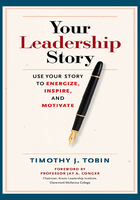
PREFACE
Most of my professional working life has been focused on leadership development. I studied it in school. I have helped a variety of large and small organizations build award-winning leadership programs. I have worked with leaders across industries. I have had the opportunity to work with top leaders and world-class leadership speakers. I have led small teams and big teams. And I have observed others doing the same. I have also been fortunate to have some great mentors. And I have been equally fortunate to coach other leaders. I am a student of leadership. I have dedicated my life to it, and I have learned a great deal along the way.
If you look closely, you might say I have leadership coming out of my ears. (It's really not as uncomfortable as it sounds.) So as you launch into this book, you might be thinking, this guy must be a leadership genius. He must be (sound of horns) The Perfect Leader.
And do you know what? You would be wrong. OK, perfect is probably not a fair or realistic goal for anyone to strive for when it comes to leadership. There are just too many moving parts to leadership for anyone to be able to nail it all the time.
So to be fair, let's say the target is to be a consistently great leader—the kind of leader who inspires and motivates others. Someone who leaves a positive, lasting impression. That seems more realistic and more attainable.
Whatever the end measure, truth be told, I still don't get leadership right all the time. Heck, I'd settle for pretty darn good on some days.
Let me pause right there for a second. Why would anyone want to strive for leadership greatness? If it is to feed the ego, reconsider: it rarely ends in greatness. If the motivation is more altruistic in nature—to help others, guide them, develop them—you will find consistently greater fruits of your leadership labor.
If I can spend all this time immersed in the topic of leadership and not always get it right, how are people who are focused on countless responsibilities other than leadership supposed to get it right? That is an awful lot to expect. I've encountered great leadership, and I've seen great leaders have off days as well. To me, though, it's all the possibilities that make leadership so fun. That's right—leadership should be fun. But let's not underestimate the level of effort, planning, and development that our leaders require if they are to be at their best for those they lead.
Success at one point in one's career does not guarantee success at another point. I have seen in far too many instances that highly capable technical experts are promoted to a leadership position—with little or no leadership training. And they are expected to continue on their path to excellence. Unfortunately, what I've also seen is that sometimes that works out and sometimes it doesn't. I'm not much of a betting man, but I don't like those odds.
We've all heard the "Leadership is a journey" metaphor, and it is fair to say that I am still on my journey and you are still on yours. In fact, this book was born out of the realization that I've still got a lot to learn. I'm also at a point where I have a lot to share.
I wrote this book primarily for emerging leaders. Look, I realize that not everyone has the opportunity to attend a multiday leadership program or to have a personal leadership coach. Both of those take time and can cost a lot of money. But it doesn't mean you should be left to your own devices to just figure leadership out. Unfortunately, for any number of reasons, that is far too often the case.
Emerging leaders likely have the most questions about leadership and the fewest resources to support their development. You should think of this book as being like a class in leadership—not the dry, theoretical stuff (don't tell any of my professors I said that) but the real, practical stuff. In fact, consider this your personal class in which to become more aware of your leadership capacity and to improve it.
And for you current leaders who think you have it all figured out, you might want to give this book a good read because you might be surprised by what you find. Of course, any leaders who are looking to better understand who they are as a leader, as well as leaders going through a career transition, will benefit as well.
I wanted to do something to help enable more people to have greater success as leaders—not simply for them but also for those they lead. To create all-around better experiences. To develop more people. To—as the book's subtitle suggests—energize, inspire, and motivate others to be their best. And leadership is about people, to be sure, but it is also about delivering better results for the business in the process.
If you've read this far, I hope you have an interest in becoming a better leader. I would love to contribute to your journey in some way. So we're in this together now. You'll see that I ask a lot of questions throughout the book. I would encourage you to avoid a superficial treatment of the questions and activities, and instead to reflect upon them deeply. Forget about the rule against writing in a book—if you've got an insight, don't let it get away.
As with many things, you can expect to get only what you give. If you are willing to challenge yourself with some of the questions and look more deeply within yourself, you will gain far greater—possibly even transformational—benefits. I tend to lean toward optimism. With a greater understanding of your leadership story, you'll find that the best is yet to come.
Timothy J. Tobin Washington, D.C.